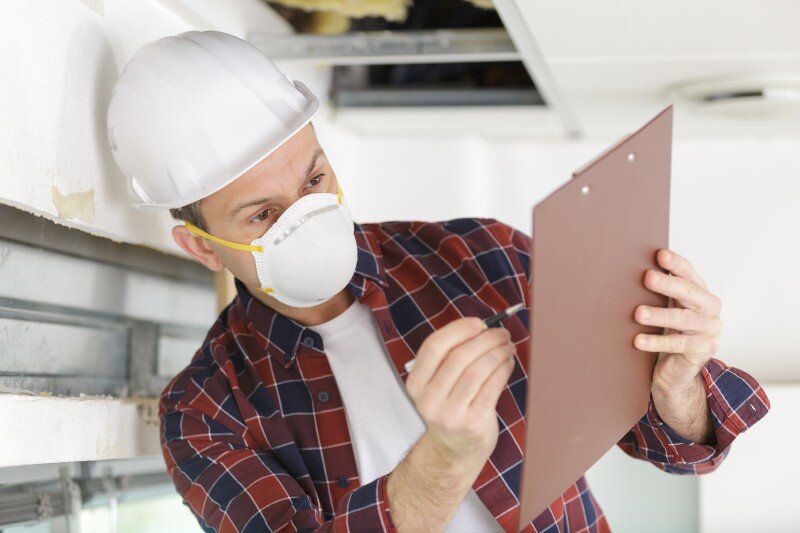
If you’re planning on selling a house, a home inspection is an important step that you will have to complete before closing the sale. However, what exactly is a home inspection, and what does it involve? Will it cost you a lot of money? This article will explain how to get a home inspection and provide a home inspection checklist to help you prepare for it.
What Is a Home Inspection?
A home inspection is a professional inspection by a certified home inspector. A home inspector will come to your home, conduct a walkthrough, and thoroughly inspect its overall state and the structure and systems to ensure they are in good condition.
The goal of the inspection is to detect potential problems in the home, such as water damage, pilot lights that don’t work, and poor water flow. These things might not be immediately apparent to potential buyers when they visit the home for the first time. Once the inspector finishes their inspection, they will release an inspection report detailing their findings.
It’s important to differentiate between a home inspection and a home appraisal. A home appraisal, which lenders require before approving a mortgage, is a professional report determining the price of a real estate property. A professional home appraiser bases their valuation on factors such as:
- The condition of the home
- Its square footage, number of bedrooms, etc.
- Recent comparable home sales in the area
The goal of a home appraisal is to determine the home’s value and reasonable sale price. The purpose of a home inspection is to uncover potential issues that the buyer would want to know about before moving into their new home. While that might affect its sales price, that’s not the primary purpose of the inspection.
Furthermore, a home inspection differs from a building inspection, a term people use to refer to an inspection that ensures the building is compliant with local building codes.
A building inspection might make sure the home follows local laws, such as having smoke detectors, but it won’t look at things such as poor water pressure or cosmetic issues such as a cracked driveway.
Only certain people can conduct a building inspection. For example, a licensed commercial building inspector can inspect commercial buildings for building code compliance.
Paying for a Home Inspection
As a home seller, you can order your inspection before listing to ensure there are no hidden issues that come up in the buyer’s home inspection. However, it’s not a must.
Home buyers typically order a home inspection after signing the sale contract. The contract usually contains an inspection contingency that would allow them to renegotiate the sale if the home inspection report uncovers issues. The buyer might renegotiate the sale price or ask the seller to fix deal breakers, such as termite infestation.
The buyer typically pays for the home inspection, as it’s their responsibility to ensure they are moving into a new home that is safe to live in.
Nevertheless, you can offer to pay for it if you want. It’s an extra incentive to the buyer and shows them that you are operating in good faith and want to ensure they get the home in good condition.
How Much Does a Home Inspection Cost?
The cost of a home inspection depends on factors such as your location, the size of your home, the thoroughness of the examination, and the company you hire to conduct a home inspection. However, a typical home inspection usually costs $200–$500, with the average home inspection costing $341.
If you have a small house, condo, or apartment under 1,500 square feet, it will cost around $200. On the other hand, if your home is larger than 2,500 square feet, expect to pay $400 or more.
That’s for a typical home inspection. However, you may order a more in-depth assessment to reveal potential issues that require a more thorough review to find.
That can include the presence of hidden mold, radon, lead, and asbestos. Depending on the size of the home and what you are looking for, searching for those things will typically cost an extra $100–300, as additional equipment and time are necessary.
When calculating the fees required when selling a house, include the inspection if you plan on getting a pre-listing inspection or covering the buyer’s inspection costs.
Need To Sell Your House Fast?
We make it simple to sell your house in as-is condition and help you avoid home inspections.
Just fill out the form below or give us a call at: (414) 488-0082 to get your free, no-obligation cash offer!
Length of a Home Inspection
The length of the home inspection process will depend on several factors, including the size of the home and what the inspector is looking for. A typical home inspection of a house that is 3,000 square feet should take 2–3 hours. If you have a smaller home that is only 1,000 square feet, it might only take an hour or two.
A professional home inspector will look at various things, such as:
- Gutters
- The water heater
- The air conditioning and HVAC system, including air filters
- Carbon monoxide detectors and smoke detectors
- Downspouts
- Electrical systems
- Roof shingles
- Caulk around the sinks and tubs
- Faucets
- The septic tank and plumbing system
- Water pressure
The more things there are to look at, the longer it will take. For example, it will take quicker if you don’t have an attic or crawl space. If you have a swimming pool, it will take longer.
The older the home is, the longer it will take, as there will likely be more issues to uncover. In addition, if the inspector is looking for asbestos, mold, lead, and radon, expect the inspection to take even longer.
It’s best to schedule the inspection for an afternoon or morning when you are free. That way, the inspector will have enough time to detect all issues.
Making Repairs Before Inspection
A common question home sellers have is whether they should make repairs before the inspection. There’s no single answer to that question, as it depends on your goals, the type of repairs you need to make, and the method you are using to sell your house.
If you sell through a real estate agent, it’s essential to take care of major repairs, like structural damage. It will be hard to sell a house fast in Elm Grove if it has foundational damage, for example. These repairs might be expensive, but they’re critical.
In addition, consider making cosmetic repairs to improve your home’s curb appeal and give buyers an excellent first impression when visiting your home for the first time. Repaint the exterior, hire a landscaping company to mow your front lawn and plant some bushes, and get a deep cleaning.
Cosmetic repairs don’t usually cost much money, but they can make a big difference in helping you sell your house faster.
That’s why many home sellers opt to get a pre-listing inspection, as it allows them to uncover things they should repair. Otherwise, the home selling process might drag out later.
What if you don’t have any money to invest in repairs? In that case, you can sell to cash home buyers in Wisconsin. Cash home buyers purchase homes as-is and don’t require you to spend money on an inspection beforehand.
Home Inspections in Wisconsin
Getting a home inspection in Wisconsin isn’t complicated. Your real estate broker can help you find a company to perform the inspection. Most of the time, though, the buyer will be ordering the inspection.
Here is a quick checklist of things you might want to fix before the buyer’s inspection:
- Repair water damage, fire damage, structural damage, and other significant problems.
- Upgrade the HVAC system and replace the filters.
- Replace burst pipes and fix low water pressure.
- Repaint the interior and exterior.
- Get a landscaping company to improve the home’s curb appeal.
Here are some things you should avoid spending money on:
- Remodeling the kitchen.
- Turning a bedroom into a home office.
- Fixing light fixtures or upgrading the faucets.
- Investing in a sunroom or installing a swimming pool.
If you know your home has severe damage, consider selling to a cash buyer instead. You will save a lot on fees, as you won’t have to deal with a real estate broker and pay them a commission. You also won’t have to spend money on repairs.
There are other benefits to selling to a cash buyer, such as enjoying a quicker closing process.
Many sellers ask, “How long does it take to sell a house?” It will take longer if you sell through a traditional real estate agent. You might have to make repairs, which can take time. Other things that take time include getting an appraisal and getting approval from the mortgage lender so the sale can proceed.

Conclusion
We buy houses Milwaukee locals love. We aim to make the process as straightforward and uncomplicated as possible.
Start by requesting an offer online. We will be in touch to learn more about your property and schedule a walkthrough, so we can give you a price valuation. However, you can also send us pictures. We will provide you with a fair cash offer. Once you accept, we will close on your schedule with minimal hassle – we can close right away or wait until you’re ready.
